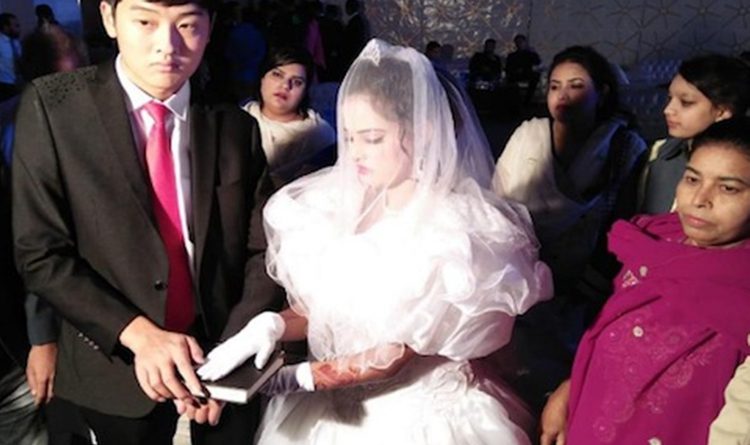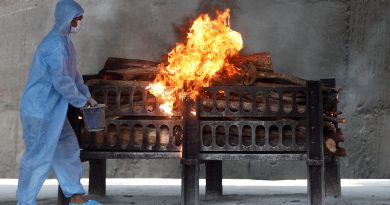629 Pakistani girls sold as brides to China: Associated Press Report
Lahore (AP) – Page after page, the names stack up: 629 girls and women from across Pakistan who were sold as brides to Chinese men and taken to China.
The list, obtained by The Associated Press, was compiled by Pakistani investigators determined to break up trafficking networks exploiting the country’s poor and vulnerable.
The list gives the most concrete figure yet for the number of women caught up in the trafficking schemes since 2018.
But since the time it was put together in June, investigators’ aggressive drive against the networks has largely ground to a halt. Officials with knowledge of the investigations say that is because of pressure from government officials fearful of hurting Pakistan’s lucrative ties to Beijing.
The biggest case against traffickers has fallen apart. In October, a court in Faisalabad acquitted 31 Chinese nationals charged in connection with trafficking.
Several of the women who had initially been interviewed by police refused to testify because they were either threatened or bribed into silence, according to a court official and a police investigator familiar with the case.
The two spoke on condition of anonymity because they feared retribution for speaking out.
At the same time, the government has sought to curtail investigations, putting “immense pressure” on officials from the Federal Investigation Agency pursuing trafficking networks, said Saleem Iqbal, a Christian activist who has helped parents rescue several young girls from China and prevented others from being sent there.
“Some (FIA officials) were even transferred,” Iqbal said in an interview.
“When we talk to Pakistani rulers, they don’t pay any attention”. Asked about the complaints, Pakistan’s interior and foreign ministries refused to comment.
Several senior officials familiar with the events said investigations into trafficking have slowed, the investigators are frustrated, and Pakistani media have been pushed to curb their reporting on trafficking. The officials spoke on condition of anonymity because they feared reprisals.
“No one is doing anything to help these girls,” one of the officials said. “The whole racket is continuing, and it is growing. Why? Because they know they can get away with it. The authorities won’t follow through, everyone is being pressured to not investigate. Trafficking is increasing now.” He said he was speaking out “because I have to live with myself. Where is our humanity?” China’s Foreign Ministry said it was unaware of the list.
“The two governments of China and Pakistan support the formation of happy families between their people on a voluntary basis in keeping with laws and regulations, while at the same time having zero tolerance for and resolutely fighting against any person engaging in illegal cross-border marriage behaviour,” the ministry said in a statement faxed Monday to AP’s Beijing bureau.
An AP investigation earlier this year revealed how Pakistan’s Christian minority has become a new target of brokers who pay impoverished parents to marry off their daughters, some of them teenagers, to Chinese husbands who return with them to their homeland. Many of the brides are then isolated and abused or forced into prostitution in China, often contacting home and pleading to be brought back.
The AP spoke to police and court officials and more than a dozen brides some of whom made it back to Pakistan, others who remained trapped in China as well as remorseful parents, neighbors, relatives and human rights workers.
Christians are targeted because they are one of the poorest communities in Muslim-majority Pakistan. The trafficking rings are made up of Chinese and Pakistani middlemen and include Christian ministers, mostly from small evangelical churches, who get bribes to urge their flock to sell their daughters.
Investigators have also turned up at least one Muslim cleric running a marriage bureau from his madrassa, or religious school.
Investigators put together the list of 629 women from Pakistan’s integrated border management system, which digitally records travel documents at the country’s airports. The information includes the brides’ national identity numbers, their Chinese husbands’ names and the dates of their marriages.
All but a handful of the marriages took place in 2018 and up to April 2019. One of the senior officials said it was believed all 629 were sold to grooms by their families.
It is not known how many more women and girls were trafficked since the list was put together. But the official said, “the lucrative trade continues”.
He spoke to the AP in an interview conducted hundreds of kilometers from his place of work to protect his identity.
“The Chinese and Pakistani brokers make between 4 million and 10 million rupees (USD 25,000 and USD 65,000) from the groom, but only about 200,000 rupees (USD 1,500), is given to the family,” he said.
The official, with years of experience studying human trafficking in Pakistan, said many of the women who spoke to investigators told of forced fertility treatments, physical and sexual abuse and, in some cases, forced prostitution.
Although no evidence has emerged, at least one investigation report contains allegations of organs being harvested from some of the women sent to China.



